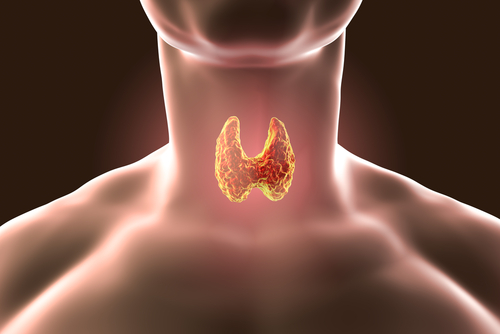Sjögren’s Patients More Likely to Develop Thyroid Disease, Review Shows
Written by |

Sjögren’s syndrome patients are three times more likely to have thyroid disease, both autoimmune and non-autoimmune, than controls, a review of eight published studies shows.
The study, “Increased risk of thyroid disease in patients with Sjogren’s syndrome: a systematic review and meta-analysis,” was published in PeerJ.
Sjögren’s syndrome is an autoimmune disorder characterized by abnormal infiltration and accumulation of immune cells inside certain glands. It affects multiple tissues and organs, leading to inflammation and sometimes causing irreversible damage.
Sjögren’s syndrome and thyroid disease share common genetic and environmental risk factors, and because their incidence increases with age, researchers believe that the two conditions might be caused by aging-induced damage to the immune system.
But while studies attempting to understand the relationship between the two conditions have shown a higher prevalence of autoimmune thyroid disease in Sjögren’s syndrome patients, they have produced inconsistent results regarding non-autoimmune thyroid disease.
To address these inconsistencies, researchers at China’s People’s Hospital of Liaoning Province reviewed clinical data from studies on the link between Sjögren’s syndrome and thyroid disease.
In total, eight studies — with a total of 988 Sjögren’s syndrome cases and 2,684 controls — matched their eligibility criteria and were selected for further analysis.
Researchers found that Sjögren’s syndrome patients were 3.3 times more likely to develop thyroid disease than controls, regardless of the nature of the thyroid problem. But looking at both autoimmune and non-autoimmune thyroid disease, a similar association was found, with patients being 3.4 and 2.9 times more likely to have these conditions, respectively.
Investigators also examined whether Sjögren’s syndrome was associated with hyperthyroidism or hypothyroidism, and found that both conditions were also more likely in patients than in controls — 3.8 and 2.6 times the risk compared to controls.
“To the best of our knowledge, this systematic review is the first to estimate the risk of thyroid disease in Sjögren’s syndrome patients,” researchers said.
These results “support the hypothesis that the risk of thyroid disease is increased in patients with Sjögren’s syndrome, [who] should be screened for thyroid disease,” investigators said.
Additional studies are still warranted to explore the underlying mechanisms and risk factors that may contribute to the increased susceptibility of Sjögren’s syndrome patients to thyroid problems.





